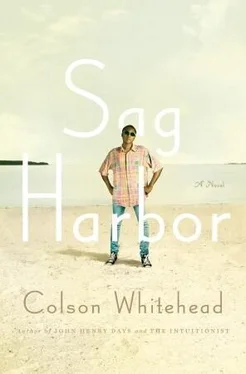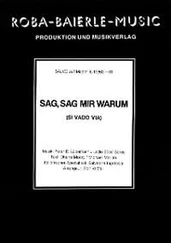“Yes.”
“How's he doing?”
“I don't know.”
We called his father Uncle Gideon, which was what our mother called him. Look at Uncle Nelson now and you saw him in there. Although he was as skinny as me when he was younger, Nelson had grown into his father's shape, his belly spreading out, his cheeks rounding into apples. Uncle Gideon didn't have much time for kids, which was fine with me, and I didn't remember that much about him beyond what trickled out in my mother's stories about her cousin's misadventures. “Uncle Gideon was mad .” “You should have seen Uncle Gideon's face when he got the bill.” In my mind he was a character standing to the side of one of the bad-boy anecdotes, tsk-tsking at high jinks. One of the founding fathers, with their ideas of how proper black people should act.
Bobby cleared his throat.
Uncle Nelson said, “He told me, ‘Don't set foot in my house ever again.’ So I'm not.” I stared straight ahead. “That doesn't mean I can't look, does it?” he asked. The developments were usually hopping this late in the season. It wasn't too late. You could count on a barbecue or two at least, winding down to stragglers, a get-together shrinking to diehards, the people with nowhere else to go. But no one was around. I heard nothing except my uncle's breathing. The previous stops had been window-dressing. This is where he wanted to be. “I can look, right?”
An insect sizzled in the zapper, converted to smoke. He flipped a switch in himself. He clapped his hands together loudly and said, “Let's go, boys! If you drop me at the Nicholses', I'll be much obliged, and I'll see those fine fine people and relieve them of their fine fine liquor. It's early yet!”
“Okay,” I said.
When we dropped him off, Bobby said, “Well, that was a buzz kill.”
I said, “Yeah.” But mostly I thought, Evil. Nothing else to call it. I could've made up my own lyrics to what passed between the father and the son, something about misunderstandings, the ones that don't matter and the ones that are everything, but I would've gotten the words wrong. Make up lyrics to someone else's song and you put yourself in there, botching it all.
AS “RAPTURE” TRANSFORMED INTO “BAD GIRLS,” NP tapped my shoulder, materializing in the crowd with two Bartles & Jaymes wine coolers in his hands. He gave me one. He started to speak but it was too loud to hear him. I knew what he was saying anyway. It was going to be a great night.
One more thing, before the concert starts, and they're going to go on any second, you can feel it. It's not that important, but in case it comes up — Sagaponac is a Native American word meaning “the land of big ground nuts,” not “big brown nuts.” The place mats of the Corner Bar contain a world of knowledge, never to be doubted. Bobby misread. I'd hate for you to repeat that in conversation. It might lead to complications.
Now you'll have to excuse me. Can you feel it? It's about to start.
EVERYBODY HATED WLNG. IT WAS SAG HARBOR'Slone radio station, beaming out sentiment at 92.1 megahertz, reverberating through our skins and inner transistors even when the stereo was off. They called themselves a Classic Oldies station, spinning the requisite Motown and Beatles and barefoot singer-songwriters to justify themselves to advertisers, but their specialty was the oddball tune, the one-hit wonders and fluke achievers, the “Popcorn”s, the “Monster Mash”es, the sublimely dreadful “Itsy Bitsy Teenie Weenie Yellow Polka Dot Bikini”s.
Everybody'd heard those goofy songs a million times before, and it was a cold cold heart that didn't hum along for at least a second. What sent people trampling to the exits was a different kind of onehit wonder, a species of song so cloying and unashamed that the soul shivered in recognition. They came to WLNG to die, these misfit ditties: feverish declarations of affection, tearjerkers about magical last-chance afternoons, odes to the everlasting that were thinly veiled bids for restraining orders. Rented-by-the-hour string sections sawed away at our resistance, lonesome sax solos paraphrased heartbreak. I can't tell you the names of the songs because I don't know, can't say who got the songwriting credit and who cashed the royalties. All I could do was succumb to the LNG Effect when these songs came on.
It proceeded thusly: out of the speakers emerged a song you'd heard only once before in your life, one that left such a faint record in your brain that it was a memory of a memory. Paralyzed by confusion, you wondered, Where have I heard this before? The answer was, Nowhere important. Far from scoring some significant life passage, it was most likely the soundtrack of an anti-event — searching for the matching sock, wiping tartar sauce from your lip — but the deep sense of familiarity and loss was unshakable. That was the LNG Effect — a feeling of nostalgia for something that never existed. It creeped people out. And maybe you'd never even heard the song before, only thought you had and completely invented the connection, so nimble the song's persuasion. There was a quality to the voices of the singers, these faceless warblers and sweater-vested harmonizers, that made their corny scenarios and schmaltzy pleas hypnotizing, transporting. For a few verses, that was you trotting along by the departing train car, coming around to tell the truth after all this time, that was you in the foxhole begging your girl back home to stay true, that was you standing there without defenses for once, in the pouring rain, saying what had to be said. You can't say longing without the l, n , and g .
At some weak moment these songs had hit the pop charts, mingling with the more likely pop creations for one brief, glorious instant. Out of place at the party, digging their elbows into the wall and nervously chugging punch before they were found out. They fell out of the Top 40 and tumbled down the rankings, plummeting away from most people's consciousness … out of our universe and into another, welcomed into the WLNG firmament the second they hit 41, twinkling in their bygone constellation. I imagine that the LNG Effect was exactly the opposite for the singers. For them, hearing their songs come on wasn't the reinforcement of an illusion but the affirmation of reality — if someone was playing their record after all this time, then they actually existed and it wasn't just a dream, their moment onstage. They heard their words again, restored after being stripped by Muzak-makers and elevator composers, and were made whole.
Everybody hated WLNG because WLNG fucked you up. They turned the station in a New York minute. My friends had no time for it, fiddling for rogue, clear-day broadcasts from KISS FM in the city. My brother was entering a big reggae phase. My mother liked classical music, zooming past 92.1 on the way to all that public radio wine and cheese at the bottom of the dial. And while my father had a well-known weakness for Easy Listening, he loathed the voice of LNG's afternoon guy, Rusty Potz — Rusty Potz! — whom he referred to as “that man” before shutting off the little Panasonic boom box in the corner of the dining area.
So of course WLNG was (one of) my secret shame(s), indulged when I had the house to myself. The songs were too mawkish to be anything other than solo pleasures, savored in private while tickling invisible ivories or fondling a phantom microphone. The furtive way I scoped out the premises, slowly turning up the volume on the radio, wary of every increment, setting it a little higher and higher as I grew bolder, certainly echoed universal porn protocols. Sometimes I forgot to clean up after myself and hours later I'd hear “Who's been listening to WLNG?” from the living room, whereupon I'd walk out and declare “I hate that station!” like a proper citizen. In fact, my father asked the question the same way he asked “Who's been watching Channel J?” in the city, when the dial on the cable box pointed to the local red-light district. Channel J, home of Ugly George and Midnight Blue , the porny public-access shows that had been many a Manhattan boy's and girl's introduction to naked moving parts, a stretch of shabby Times Square in the TV lineup. Sometimes I was the culprit, sometimes not. It says a lot about the world that being walked in on with your hands down your pants while Al Goldstein played some grainy action clip of Seka was preferable to getting caught singing along to “Who Put the Bomp (In the Bomp Bomp Bomp).”
Читать дальше












